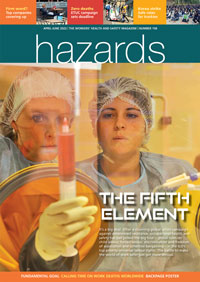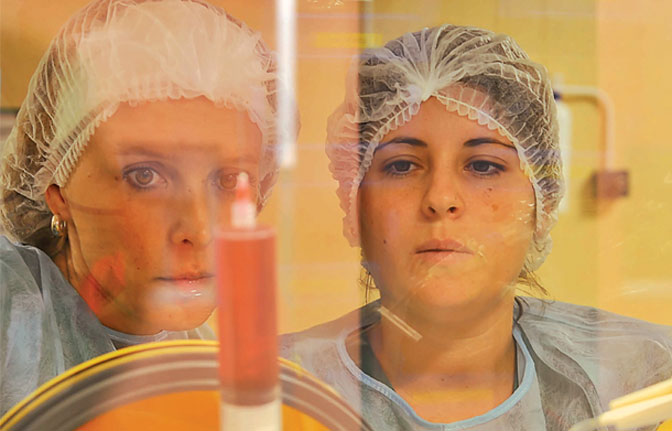
It was the end of a long campaign by trade unions and health and safety professionals, and a major victory that should allow us to make a real difference in workplaces. On 10 June 2022, the 102nd International Labour Conference (ILC) in Geneva finally agreed to recognise that occupational health and safety is a fundamental principle and right at work.
It extends the fundamental rights that are the heart of the UN International Labour Organisation’s (ILO) regulatory matrix from four – freedom from child labour, freedom from forced labour, freedom from discrimination at work and freedom to associate and collectively bargain – to five, nearly a quarter of a century since the first fundamental rights were adopted in 1998.
This is long overdue, and it is only the beginning. If the decision is really going to impact on the global death toll due to work of 3 million deaths a year, and the tens of millions of occupational injuries and illnesses, then there is a lot more to do, and the campaigning that has been so successful needs to be ramped up.
Union campaigning works
But it’s still worth reflecting on the triumph for trade union campaigning that this move represents. Unions have been arguing that health and safety should be a fundamental right since before the 1998 Declaration which – because we could not get employer agreement or sufficient government support – left health and safety out.
Three years ago, in the groundbreaking ILO Centenary Declaration, the tripartite constituencies of the ILO, governments, employers and unions, agreed it should happen, and in what is very fast in terms of international law – but still too long for those of us impatient to save people’s lives – it took us just three years to get it agreed by governments and employers.
The June ILC saw final discussions on: Which ILO Conventions should become the ‘core conventions’ that all ILO member states are required to uphold regardless of ratification; whether the right should cover the working environment or just working conditions; whether prevention of injuries and illness should be described as a shared responsibility of employers and workers; and whether the new fundamental right should apply retrospectively in trade deals.
Duties and rights
Some of these arguments look like minor disagreements on wording, but they are hugely important. It’s a testament to union campaigning that we won three out of four.
On environment rather than conditions, unions argued that ‘working environment’ is broader and would have much greater effect on preventing injuries and illnesses because it will allow us to raise work organisation, long hours and the actual way decisions on health and safety are taken, not just managing the risks of particular hazards at the workplace.
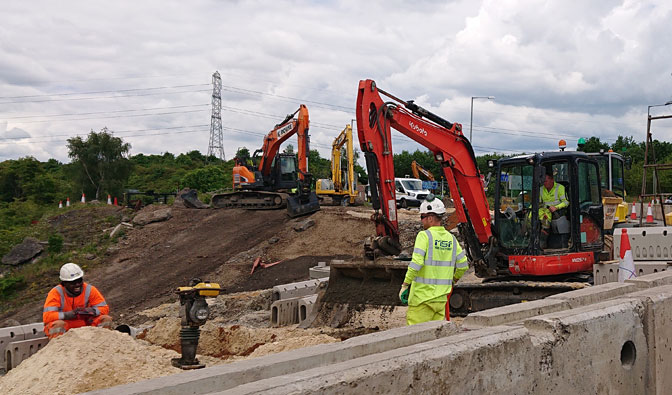
BIG JOB Unions and safety campaigners, victims’ families and others will need to dig deep to make fundamental safety a reality, says ITUC. Organising around health and safety will be a top priority.
Despite the national practice in large parts of Europe and North America – where governments were generally key supporters of the union case on health and safety – African governments joined unions to secure agreement that the fundamental rights will cover the working environment.
On shared responsibility, employers had argued that health and safety at the workplace depends as much on the decisions and actions of workers as employers but, again, we successfully argued that when it comes to occupational health and safety, employers have duties and workers have rights, albeit that workers do have the duty to co-operate with health and safety rules.
On trade deals, the employers and some governments were concerned that, without clearly ruling it out, the generally accepted principle of international law that new rights don’t apply to previously agreed trade agreements might be breached.
The ILO’s legal advisers, many governments and the trade unions saw no need for such a restatement of custom and practice, but we accepted the reiteration as long as it was clear that it didn’t bind any future agreements or the mutually agreed renegotiation of existing deals.
Core conventions
And then, finally, the ILC needed to take a decision on which ILO conventions would become ‘core conventions’ alongside the existing eight – two for each fundamental right. This decision really does matter, because the core conventions get the most attention and become the gold standard against which national performance on labour laws are judged. They very often influence trade negotiations, global financial institutions’ investment decisions and the operation of global supply chains.
Employers entered the conference committed only to Convention 187 (C187) on the promotion of health and safety. It contains a requirement to establish tripartite national health and safety bodies like the UK Health and Safety Executive to oversee health and safety at work, but little else in the way of rights for workers.
Unions demanded that Convention 155 (C155) on occupational health and safety should be the main core convention because it contains a raft of rights, such as the right to be consulted and the right to refuse dangerous work, which largely determine whether workplaces are safe and healthy.
We also argued for Convention 161 (C161) on occupational health services, which would extend the global coverage of such services from its current dismal 20 per cent of formal sector workers and help tackle the two-thirds of deaths due to work which are from occupational disease rather than injuries.
In the end, we reached agreements on C155 and C187, and made the case for C161 to be given a higher profile in international labour standards. We won’t be letting that drop.
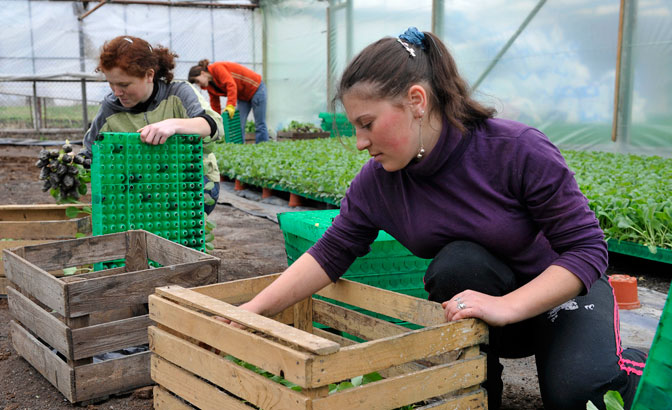
Crucial to winning the case for C155 was the unity of the workers’ group which saw campaigns and lobbying around the world, and the backing of African and European governments and governments throughout the Americas – even Brazil, largely down to the role played by labour inspectors in the Brazilian government delegation, who managed to hold off the influence of the literally nauseating Bolsonaro presidency.
Governments that expressed opposition were mostly Asian – Bangladesh, China, India and even Japan.
Employers’ representatives in the International Organisation of Employers (IOE), while professing to support health and safety and eventually agreeing to the deal with unions, threw all sorts of arguments in the way. It’s worth remembering – and we shouldn’t ever let them forget – that they had to be dragged kicking and screaming all the way from the ILO Centenary Declaration to the final negotiations.
They postponed the decision by at least a year and demanded all sorts of extra information, ignoring occupational health and safety professionals and practitioners as well as unions everywhere, to try to delay the decision.
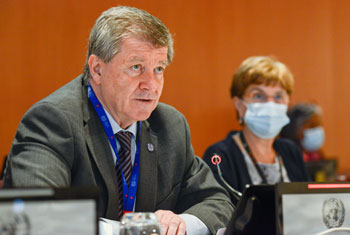
UNION LEAD Dutch trade unionist Catelene Passchier, who led for the workers’ group in the ‘fundamental’ negotiations with employers and governments, looks on as outgoing ILO director general Guy Ryder addresses workers’ delegates. Passchier’s negotiating skills helped win three of the big four contentious points.
It took huge amounts of work from grassroots union campaigners through to national and sectoral unions and global union leaders to get this over the line. For two years, International Workers’ Memorial Day on 28 April focused on the campaign – the 2022 day saw more action taken than ever before.
And, bluntly, it also took a global pandemic to make clear that the world’s workplace health and safety systems weren’t fit for purpose.
Employers’ representatives eventually accepted that not only unions, but a clear majority of governments as well as progressive businesses such as the hundreds of construction companies who signed up to a campaign led by the global Building and Woodworkers International (BWI) union federation, supported C155, and agreement was eventually reached.
The International Labour Conference finally adopted occupational health and safety as a fundamental principle and right at work on 10 June 2022.
What happens next?
Unions will now turn their attention globally and nationally to working with allies in the health and safety professions including in businesses to campaign for:
- Ratification and implementation of the core conventions where that hasn’t already been achieved, and greater attention to other, sectoral or hazard-specific conventions and Convention 161 on occupational health services;
- A global leadership role on occupational health and safety for the tripartite ILO in international institutions like the World Health Organisation (WHO) and the World Trade Organisation (WTO), as well as a greater influence in bodies like the G7, G20 and the European Union;
- A greater focus and investment in organising for health and safety – promoting safety representatives, safety committees, and tools like body mapping; and
- Building occupational health and safety into mandatory due diligence laws for global supply chains and trade agreements.
The campaign to ratify and implement core conventions, especially C155, will need to be taken not only to the less developed economies of Africa and Asia, but much of the developed world too. Barely half of the European Union countries have ratified C155, and none of the G7 nations – including the UK – although half of the broader G20 economies, like Argentina, China and Mexico, have ratified it.

And we will need to press for more adherence to other conventions on issues like mine safety (C176), safety on building sites (C167) and farms (C184), rights for domestic workers (C189) and Convention 190 on gender-based violence at work.
This is not institutional tinkering – they will make a major difference in countries like Bangladesh, India and Pakistan where mine disasters and factory fires are the often fatal results of the lack of tough laws, forceful inspections and union power.
The general issues will be backed up by specific campaigns and negotiations. The ILO has already agreed to develop a Convention on Biological Hazards – another long standing union demand, which would have played a major role in combating the workplace aspects of the Covid-19 pandemic – and we are campaigning across Europe and in the ILO on musculoskeletal disorders, hazardous substances like asbestos and pesticides, and psychosocial hazards.
Occupational health systems
That last category demonstrates how occupational health and safety is more than a specialist issue in the workplace. Psychosocial risks derive from long hours, work organisation, and job insecurity. Tackling the issue requires unions and employers to devise better ways to work, more people-centred than profit-driven.
And many of these issues will also require action by governments – on sick leave, social protection generally, revising the lists of occupational diseases (something else that is long overdue at the ILO) and provision of occupational health services. And that’s where ILO Convention 161 will come back into focus.
Occupational health services are vital to protecting workers from occupational illness, reducing sickness absence, and reducing the welfare bill by investing in prevention. The arguments put forward in the campaign over fundamental rights, by unions and also professionals like the Society of Occupational Medicine and the Institution of Occupational Safety and Health (IOSH) in the UK and the International Commission on Occupational Health and Collegium Ramazzini internationally, can produce wins for workers, employers and governments.
Occupational health services can be provided in the workplace, but can also be part of public health systems like the NHS. So we will be taking the campaign for bigger and better occupational health service provision to the World Health Organisation as well.
Again, if occupational health had achieved anything like the prominence of public health in the Covid pandemic, tens of thousands of workers’ lives would have been saved, millions of jobs would not have been lost, and there would have been shorter, lighter lockdowns leading to better mental health, less poverty and fewer incidents of domestic violence.
Raising our own game
Unions and safety campaigners, victims’ families and others will need to raise our game to achieve all this.
We will work with national trade unions and global union federations – as well as professionals and practitioners - to secure greater resources and influence for the ILO, including a stand-alone occupational health and safety section and a louder voice in international institutions for unions and for the ILO.
The ITUC’s global organising academy and global union federations will promote organising for health and safety, based on the evidence that safe and healthy working environments require unions to ensure that workers’ voices are listened to.
We will build a more effective global union health and safety network in collaboration with affiliates and global union federations, publicising victories, campaigning louder against disasters like Rana Plaza, and exchanging best practice.
So there is a huge and unfinished agenda on occupational health and safety.
The ITUC, with our 200 million union members around the world, for many of whom this issue is their top priority, looks forward to working with grassroots campaigners in the Hazards movement to make sure we put the gains we have made in Geneva into practical effect in every workplace on the planet, for every worker whatever their employment contract, regardless of gender, race or job.

After a stunning global union campaign against determined resistance, occupational health and safety has just joined the big four - child labour, forced labour, discrimination and the right to organise – in the ILO’s top priority universal labour rights. Owen Tudor, deputy general secretary of the international union confederation ITUC, tells Hazards what comes next.
| Contents | |
| • | Introduction |
| • | Union campaigning works |
| • | Duties and rights |
| • | Core conventions |
| • | What happens next? |
| • | Occupational health systems |
| • | Raising our own game |
| Hazards webpages | |
| • | Hazards news |
| • | Deadly business |

